In this article:
Prefixes in Russian Verbs of Motion
Prefixes in Russian verbs of motion serve to better explain the direction / nuances of the movement.
Russian prefixes at a glance
What is a prefix?
A prefix (in Russian, приставка) is an affix, or a small part of a word, which is placed before the stem of a word.
Compare: ехать (to drive) – поехать (to start driving), where по- is the prefix.
Adding it to the beginning of the word creates another word with either slightly or completely different meaning.
Let’s not forget, though, that prefixation is one of the main means of forming new words in Russian. That said, the same prefixes can be used in many other verbs, and not only in verbs of motion.
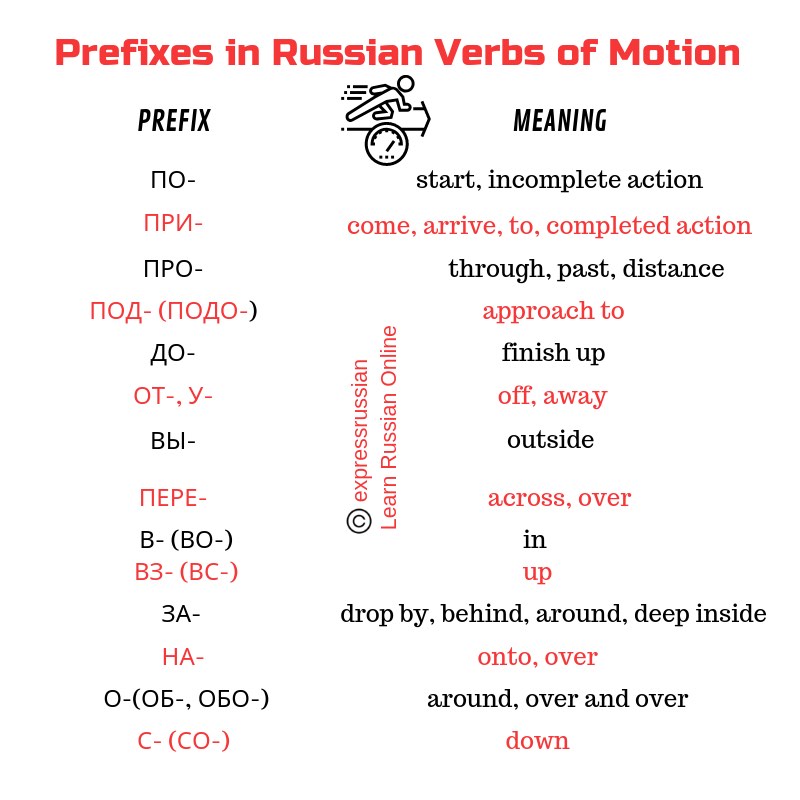
Most commonly used prefixes in Russian verbs of motion are:
по-, в-, вы-, вз-, при-, у-, под-, от-, до-, пере-, с-, раз-, про-, за-, о-/об-/обо-.
Now, let’s look at each prefix more closely and illustrate them with examples!
Prefix по-
– start of action
Пойдем в кино? – Let’s go to the cinema?
Поехали, уже поздно. – Let’s go, it’s late.
Мой сын в этом году пошёл в школу. – My son went to (started) school this year.
Побежали! – Run!
Подул ветер. – Wind started to blow.
Я почувствовал недомогание. – I felt unwell.
– action taking place from time to time
Он к нам частенько похаживает. – He often visits us (drops by).
– insignificant or incomplete action taken in a short period of time
Дети побегали по лесу. – Children ran around in the wood.
Мы походили по городу. – We walked (rambled) around the city.
Prefix про-
– action covering a certain distance
Сегодня мы прошли 10 километров. – Today we walked /covered 10 kilometers.
На соревновании нужно проплыть 200 м. – At the competition, one needs to swim 200 m.
– result of action within a certain period
Самолет пролетел маршрут за два часа. – The plane flew the route in two hours (it took 2 hours).
– action directed through something
Вам надо пройти через парк. – You need to go through the park.
Он прошёл сквозь толпу. – He passed through the crowd.
– movement past something or moving forward
Проходите по коридору! – Walk down the corridor!
Сейчас мы проезжаем мимо вокзала. – Now we are driving past the train station.
– single action, action happening at one go
Провести занятие по русскому языку. – To give a Russian lesson.
Пройти тест на знание русского языка. – To take a test of knowledge of the Russian language.
Prefix под-
– approaching, joining something (подъехать – to drive up, подшить – to hem)
Подходите ближе к памятнику, чтобы лучше его рассмотреть. – Come closer to the monument to see it better!
Я подъезжаю. – I am almost there (while driving).
Prefix до-
– bringing something to a limit or a finish line
Дойдите до Красной площади и поверните налево. – Come to the Red Square and then turn left.
Сегодня я планирую дописать сочинение. – Today I plan to finish my essay.
Prefixes от- and у-
– moving away from somewhere / something / someone
Mind the difference:
prefix от-/ото- means a removal for a short distance or for a short time (отъехать – to move off, откатить – to roll back), while
prefix у- means a complete and definite removal from a place (уехать – to leave, уползать – to crawl away, убрать – to remove):
Я отойду на 5 минут. – I’ll be back in 5 minutes.
В метро вы можете услышать: отойдите от края платформы. – In the subway, you may hear: keep off from the edge of the platform.
Я решил уйти с работы. – I decided to quit work.
Он уже ушёл домой, будет только завтра. – He has already left (gone home), will be back tomorrow.
Prefix вы-
– action happening from inside to outside (выехать – to set off, выгнать – to kick out, выйти – to get out)
Экскурсия закончена, туристы выходят из Кремля на улицу. – The tour is over, the tourists are now leaving the Kremlin.
Утром я выхожу на работу в 7 часов. – In the morning, I leave home to go to work at 7 am.
Prefix пере-
– movement from one place to another, crossing a line (переехать – to move, in sense to start living in another place, перейти – to cross over, перебросить – to throw over).
Не переходите через дорогу на красный свет. – Do not cross the road on red light.
And also, in NON-motion verbs
– excessive intensity of action (перегреть – to overheat, переварить – to overcook)
– repeated action, usually with an additional meaning “in a new way, otherwise” (переделать – to remake, перевоспитать – to re-educate, перешить – to alter the clothes)
Prefix вз- / вс-
Prefix вз- or it’s equivalent вс- (before deaf consonants) means to “go up”.
Всходить на гору. – To climb the mountain.
Взошло солнце. – The sun has risen.
Prefix в- (во-)
– direction of movement into something, inside (въехать – to drive into, вставить – to put in)
Prefix при-
– bringing the action to the final goal, to achieve, to reach a destination
Они пришли. – They came.
Она приезжала в город на три дня. – She came to the city for three days.
– bring two points together
Она пришила кружево к платью. – She sewed lace to the dress.
Prefix за-
– passing by a place where it’s not planned to stay long
По дороге с работы зайди в магазин. – Оn your way back from work, please drop by a grocery store.
Я зашла к подруге на полчаса. – I came to see (dropped by) my friend for half an hour.
– moving deep into some space (зайти далеко в лес – to go far into the forest)
– movement behind, around an object (зайти за дом – go behind the house)
In NON-motion verbs, sometimes means “the beginning of the action” (захотеть = to start wanting / to become keen on something abruptly, застучать = to start knocking)
Prefix на-
– movement onto a surface (наехать – to drive onto, нашить = to sew onto/over);
Prefix о- (об-, обо-)
– movement around something (объехать = to circle around, to drive around, обжарить = to fry from both sides, обойти = to walk around)
– coming to the same places over and over (обойти все магазины = to visit all the shops, объехать весь город = to go around the whole city).
Prefix с- / со-
– motion happening from top to bottom, movement down (съехать = to move down, to move out, сбросить = to throw down):
Я схожу с лестницы. – I’m going downstairs.
Снег сошёл с крыши. – Snow came down from the roof.
Prefix с- together with postfix -ся indicate the connection of several people, the arrival from different places to one: сбежаться formed from бежать, слететься – from лететь
Prefix раз- (рас-) together with postfix -ся indicate the opposite: disconnection, dispersion to several places: разбежаться from бежать, разлететься from лететь.
See this graphic to help you understand better:
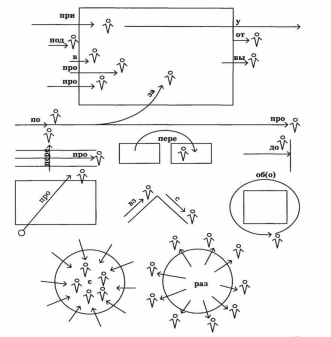
Russian Verb of Motion ИДТИ (to go) with Prefixes – Example
See how we can add prefixes to verbs in Russian and create verbs with new meanings. In English, the same function is done by adverbs, like “away”, “off” etc.
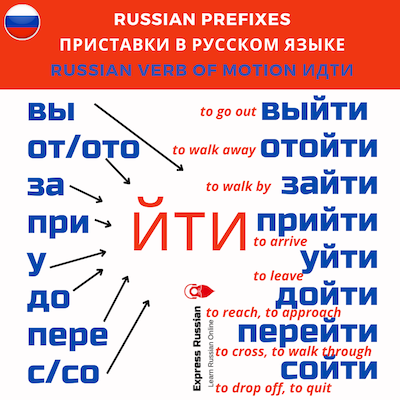
Prefixes in Russian Verbs of Motion and Aspects
In Russian, all verbs can have 2 aspect forms – imperfective and perfective. Aspect indicates whether an action was successfully completed (perfective) or not (in this case, we use imperfective aspect form). Learn more about Aspects in the Russian language.
With the help of prefixes, unidirectional Russian verbs of motion regularly form verbs in perfective aspect denoting “start of action” (побежать = to run, поехать = to go, пойти = to set off, to start walking) or “spatial relations” (выбежать = to run out, добежать = to run to / to reach, перебежать = to run across, отбежать = to run off).
The latter regularly form specific pairs of verbs in perfective / imperfective aspect (перебежать — перебегать, добежать — добегать, отбежать — отбегать).
Verbs of multidirectional movement also form prefixed verbs in perfective aspect, but with some additional shades of meaning, for example, meaning of time (походить: Я походил по центру города и вернулся в отель – I walked around the city center and returned to the hotel (action is limited in time) or the result of the action (добежать: Я добежал на вокзал за 5 минут до отправления поезда – I ran to / reached the train station 5 minutes before my train departure).
————-
Related posts:
Verbs of Motion in The Russian Language
Russian Prepositions & Russian Cases
Also see:
Online Course on Russian Cases
Online Course “Russian Grammar Made Easy” (on Udemy platform)

Follow ExpressRussian on Instagram, YouTube and TikTok
to learn new Russian words and phrases every day with fun.
Stay tuned!

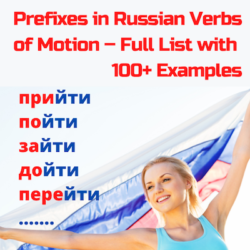
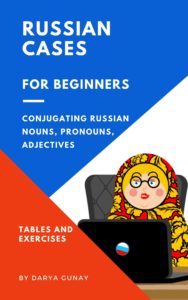
3 replies on “Prefixes in Russian Verbs of Motion – Full List with 100 + Examples”
[…] *in the example above, imperfective and perfective forms differ in prefix. Learn more about Prefixes in Russian Verbs of Motion […]
Thank you for this very clear and detailed tutorial!
Very helpful!
I am happy you like it! Enjoy learning Russian!